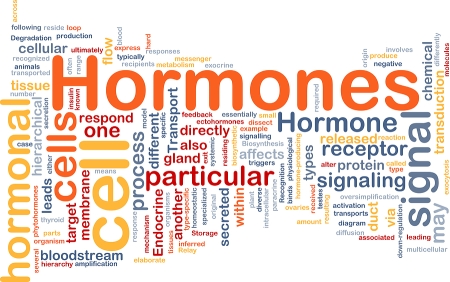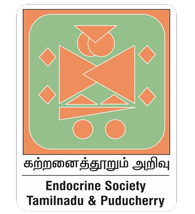
“Endo” means “inside” and “crine” means secretions. Endocrinology is the branch of medicine dealing with the study of glands which secrete chemicals called “hormones” into the blood stream directly. For the latter reason they are also called “ductless” glands. This is in contrast to other glands like tear or salivary glands the secretion of which are seen outside [exocrine glands]. The basic function of the endocrine system is for communication between various organ systems in the body. The hormones secreted by the endocrine glands are carried in the blood stream to various parts of the body and interacts with its designated place in the target cell called “receptor” and produces the desired effect on that cell.
The various endocrine glands in our body are hypothalamus (in the base of the brain), pituitary gland (also called the “Master gland”), thyroid gland, parathyroid glands, pancreas, adrenal glands, testis (male), ovaries (female) and adipose tissue (fat cells). Some of the important functions in our body controlled by these glands include
- Growth (Growth hormone produced from Pituitary gland)
- Metabolism (Thyroxine produced from Thyroid gland, Insulin & Glucagon from Pancreas)
- Control of appetite and food intake (hormones from fat cells and Hypothalamus)
- Maintenance of bone health (Parathormone produced from parathyroid gland)
- Maintenance of salt and water balance (Antidiuretic hormone from hypothalamus, Aldosterone produced from adrenal glands)
- Maintenance of blood pressure, recovery from stress (hormones from adrenal glands)
- Reproduction (LH, FSH produced from pituitary gland and hormones from reproductive organs)
- Milk secretion (prolactin from pituitary gland and oxytocin from the hypothalamus)
When the hormone secretion is irregular (either reduced or excess secretion), structural and functional changes occur in our body which leads to several diseases like
- Stunting of growth or short stature
- Diabetes
- Overweight and Obesity
- Low bone strength, multiple fractures or Osteoporosis
- Lack of sexual maturity or delayed or early puberty
- Irregular menstruation.
- Infertility/ Polycystic ovarian disease
- Low or high blood pressure.
Endocrinologists are specialists trained in diagnosing and managing diseases pertaining to endocrine glands and consequent hormonal imbalances. Treatments of endocrine problems are usually simple but they require proper and periodic hormonal check-ups and long-term regular follow-up.
